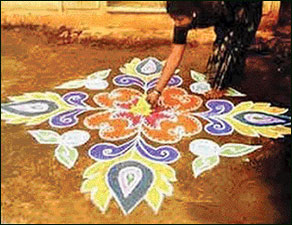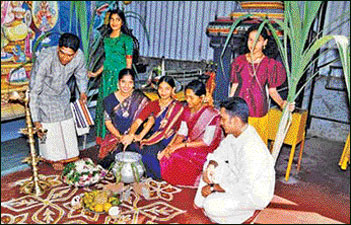|
Variety
Thai Pongal- Festival of Thanksgiving
The festival of Thai Pongal is approaching. It is a festival of Tamil
Hindus, both in Sri Lanka and India. It is the time when the first crops
of rice are harvested, and rice being a staple of the community, they
give thanks to God, nature and the most useful agricultural animal - the
bull/cow. That festival of thanksgiving is the Thai Pongal.
It usually falls on January 13 or 14, in the Tamil month of Thai;
Pongal refers to the sweet rice pudding made on that day, which in turn
gets its name from the fact that it is allowed to boil over the pot.
Pongal means boiling over.
  Tamils
believe that a pot boiling over with its ingredients signifies
prosperity and bountifulness. And so, they wait until the milk heating
in the pot boils over before putting the first grains in. Tamils
believe that a pot boiling over with its ingredients signifies
prosperity and bountifulness. And so, they wait until the milk heating
in the pot boils over before putting the first grains in.
The pongal is a pudding made with rice boiled in cow's milk. It is
sweetened with jaggery, which gives it its brown colour. It is garnished
with raisins and cashew nuts to make it tastier.
The finished product too is allowed to boil over as a sign of
prosperity. When it boils over, people call out 'Pongalo Pongal' as a
song of their jubilation.
People rise up very early to bathe and prepare for the pongal.
The pongal should ideally be boiling over by the time the sun is
rising.
Kolams (traditional designs drawn on the ground with rice flour) of
rectangular shapes are drawn in the open spaces outside homes and
temples. Within this kolam, a new clay pot decorated with mango leaves
is set on three bricks facing the East. The Sun is of paramount
importance in the farming and harvesting of crops and so the pongal is
an offering to the deified Sun God, Surya. Rain/water is also important
and so the Rain God, Indra is also propitiated on another day by South
Indian Tamils.
The pongal, once it is ready, is heaped onto a huge banana leaf along
with other delicacies, savouries and fruits and offered to the Sun.
Thereafter, the people make merry amongst themselves, visiting each
other and temples and eating pongal. Since every family makes a pot load
of pongal which they then share with neighbours and friends, one can end
up with an overdose of pongal by nightfall. The next day is the maatu
pongal (cattle pongal). Cattle, especially oxen have traditionally
played a very important role in farming, plouging the fields, serving as
bullock carts to transport produce to the market and providing milk.
In recognition of their services, they have an entire day devoted to
them, where they are bathed, garlanded and have their horns painted. The
pongal made on this day is first served to them.All throughout the year,
the farmers work and worry about their produce - once it is harvested,
their sense of relief, jubilation and gratitude finds expression in the
festival of Thai Pongal.
- Thulasi Muttulingam |

